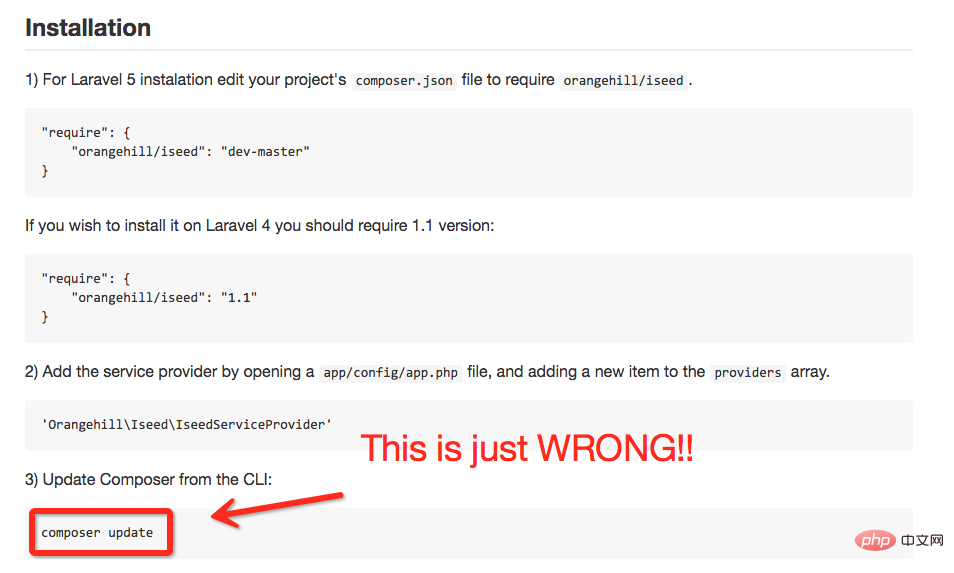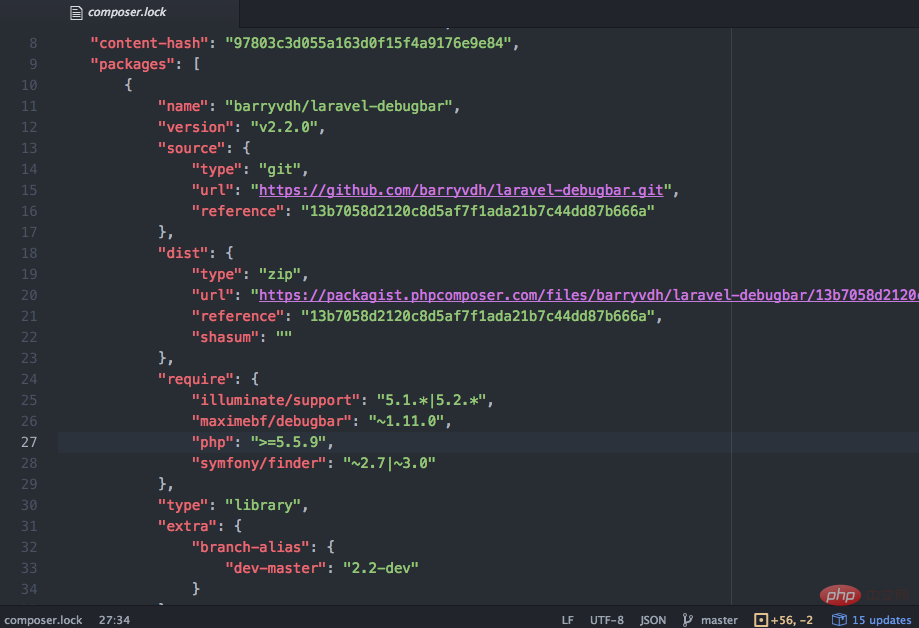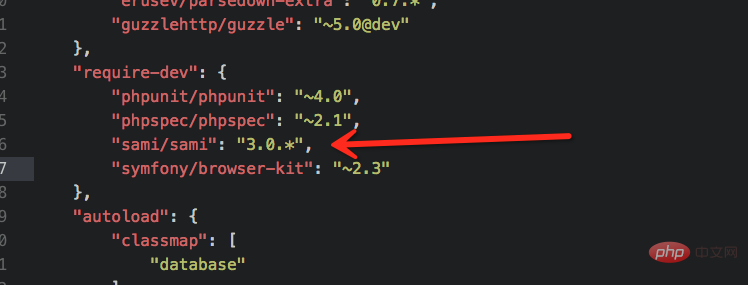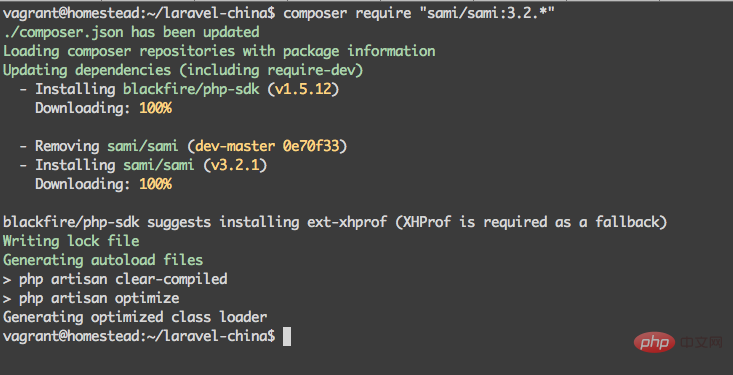Use composer update with caution!
The following tutorial column of composer will introduce to you the issues about using composer update with caution. I hope it will be helpful to friends in need!

Problem Description
We often need to add extension packages to existing projects , sometimes due to incorrect guidance in the document, as the following picture comes from this document:

composer update This command may cause great harm to the project in our current logic.
Because the logic of composer update is to update all expansion packages to the latest version according to the expansion package version rules specified by composer.json. Note, it is all expansion packages. For example, when you start the project Monolog was used. The configuration information at that time was
"monolog/monolog": "1.*",
. The monolog 1.1 version was installed. But now, more than a month later, monolog is already 1.2. After running the command, it is directly updated to 1.2. At this time, the project does not After testing against 1.2, the project suddenly became very unstable. The situation is sometimes worse than this, especially in a huge project where you have not written complete coverage tests for the project. Something broke for you. Do not know at all.
Which command should be used? install, update or require?
Next we will explain one by one.
Simple explanation
composer install - 如有 composer.lock 文件,直接安装,否则从 composer.json 安装最新扩展包和依赖; composer update - 从 composer.json 安装最新扩展包和依赖; composer update vendor/package - 从 composer.json 或者对应包的配置,并更新到最新; composer require new/package - 添加安装 new/package, 可以指定版本,如: composer require new/package ~2.5.
Process
Let’s introduce a few Daily production process to facilitate and deepen everyone’s understanding.
Process 1: New project process
Create composer.json and add the extension package it depends on;
Run composer install, install the extension package and generate composer.lock;
Submit composer. lock to the code version controller, such as: git;
Process 2: Project collaborators install existing projects
After cloning the project, run composer install directly in the root directory to install the specified version from composer.lock The extension package and its dependencies;
This process is suitable for the deployment of production environment code.
Process 3: Add a new extension package to the project
Use composer require vendor/package to add the extension package;
Submit the updated composer.json and composer.lock to the code In the version controller, such as: git;
About the composer.lock Use composer update with caution!
The composer.lock Use composer update with caution! stores the dependencies of each code The version record (see figure below) is submitted to the version controller and used in conjunction with composer install to ensure the consistency of the code versions running in the development environment and online production environment of all collaborators in the team.

关于扩展包的安装方法
那么,准备添加一个扩展包,install, update, require 三个命令都可以用来安装扩展包,选择哪一个才是正确的呢?
答案是:使用 composer require 命令
另外,在手动修改 composer.json 添加扩展包后,composer update new/package 进行指定扩展包更新的方式,也可以正确的安装,不过不建议使用这种方法,因为,一旦你忘记敲定后面的扩展包名,就会进入万劫不复的状态,别给自己留坑呀。
上面的概念不论对新手或者老手来说,都比较混淆,主要记住这个概念:
原有项目新添加扩展的,都使用 composer require new/package 这种方式来安装。
需要加版本的话
composer require "foo/bar:1.0.0"
更新指定扩展到指定版本
有时候你之前使用过的扩展包,加入了新功能,你想更新单独这个扩展包到指定版本,也可以使用 require 来操作。
如下面例子,需要更新 “sami/sami”: “3.0.” 到 “sami/sami”: “3.2.” 
命令行运行: 
The above is the detailed content of Use composer update with caution!. For more information, please follow other related articles on the PHP Chinese website!

Hot AI Tools

Undresser.AI Undress
AI-powered app for creating realistic nude photos

AI Clothes Remover
Online AI tool for removing clothes from photos.

Undress AI Tool
Undress images for free

Clothoff.io
AI clothes remover

AI Hentai Generator
Generate AI Hentai for free.

Hot Article

Hot Tools

Notepad++7.3.1
Easy-to-use and free code editor

SublimeText3 Chinese version
Chinese version, very easy to use

Zend Studio 13.0.1
Powerful PHP integrated development environment

Dreamweaver CS6
Visual web development tools

SublimeText3 Mac version
God-level code editing software (SublimeText3)

Hot Topics
 1379
1379
 52
52
 Composer's advanced features: aliases, scripts, and conflict resolution
Jun 03, 2024 pm 12:37 PM
Composer's advanced features: aliases, scripts, and conflict resolution
Jun 03, 2024 pm 12:37 PM
Composer provides advanced features, including: 1. Aliases: define convenient names for packages for repeated reference; 2. Scripts: execute custom commands when installing/updating packages, used to create database tables or compile resources; 3. Conflict resolution: use priorities Rules, satisfaction constraints, and package aliases resolve the different requirements of multiple packages for the same dependency version to avoid installation conflicts.
 Agile development and operation of PHP microservice containerization
May 08, 2024 pm 02:21 PM
Agile development and operation of PHP microservice containerization
May 08, 2024 pm 02:21 PM
Answer: PHP microservices are deployed with HelmCharts for agile development and containerized with DockerContainer for isolation and scalability. Detailed description: Use HelmCharts to automatically deploy PHP microservices to achieve agile development. Docker images allow for rapid iteration and version control of microservices. The DockerContainer standard isolates microservices, and Kubernetes manages the availability and scalability of the containers. Use Prometheus and Grafana to monitor microservice performance and health, and create alarms and automatic repair mechanisms.
 KDE Plasma 6.1 brings many enhancements to the popular Linux desktop
Jun 23, 2024 am 07:54 AM
KDE Plasma 6.1 brings many enhancements to the popular Linux desktop
Jun 23, 2024 am 07:54 AM
After several pre-releases, the KDE Plasma development team unveiled version 6.0 of its desktop environment for Linux and BSD systems on 28 February, using the Qt6 framework for the first time. KDE Plasma 6.1 now comes with a number of new features t
 The role of PHP CI/CD in DevOps projects
May 08, 2024 pm 09:09 PM
The role of PHP CI/CD in DevOps projects
May 08, 2024 pm 09:09 PM
PHPCI/CD is a key practice in DevOps projects that automates the build, test, and deployment processes to improve development efficiency and software quality. A typical PHPCI/CD pipeline consists of the following stages: 1) Continuous Integration: Whenever the code changes, the code is automatically built and tested. 2) Continuous deployment: Speed up delivery by automatically deploying tested and integrated code to the production environment. By implementing the PHPCI/CD pipeline, you can increase development efficiency, improve software quality, shorten time to market, and improve reliability.
 PHP code version control and collaboration
May 07, 2024 am 08:54 AM
PHP code version control and collaboration
May 07, 2024 am 08:54 AM
PHP code version control: There are two version control systems (VCS) commonly used in PHP development: Git: distributed VCS, where developers store copies of the code base locally to facilitate collaboration and offline work. Subversion: Centralized VCS, a unique copy of the code base is stored on a central server, providing more control. VCS helps teams track changes, collaborate and roll back to earlier versions.
 Fitbit Ace LTE receives major update with new games, contactless payment and other features
Aug 08, 2024 pm 09:39 PM
Fitbit Ace LTE receives major update with new games, contactless payment and other features
Aug 08, 2024 pm 09:39 PM
The Fitbit Ace LTE was officially launched in May, but is currently only available in the US. The smartwatch is aimed specifically at children, who can receive rewards for games through a more active lifestyle, while parents can always monitor their
 Visualization technology of PHP data structure
May 07, 2024 pm 06:06 PM
Visualization technology of PHP data structure
May 07, 2024 pm 06:06 PM
There are three main technologies for visualizing data structures in PHP: Graphviz: an open source tool that can create graphical representations such as charts, directed acyclic graphs, and decision trees. D3.js: JavaScript library for creating interactive, data-driven visualizations, generating HTML and data from PHP, and then visualizing it on the client side using D3.js. ASCIIFlow: A library for creating textual representation of data flow diagrams, suitable for visualization of processes and algorithms.
 How to use PHP CI/CD to iterate quickly?
May 08, 2024 pm 10:15 PM
How to use PHP CI/CD to iterate quickly?
May 08, 2024 pm 10:15 PM
Answer: Use PHPCI/CD to achieve rapid iteration, including setting up CI/CD pipelines, automated testing and deployment processes. Set up a CI/CD pipeline: Select a CI/CD tool, configure the code repository, and define the build pipeline. Automated testing: Write unit and integration tests and use testing frameworks to simplify testing. Practical case: Using TravisCI: install TravisCI, define the pipeline, enable the pipeline, and view the results. Implement continuous delivery: select deployment tools, define deployment pipelines, and automate deployment. Benefits: Improve development efficiency, reduce errors, and shorten delivery time.




